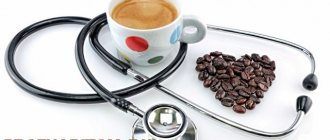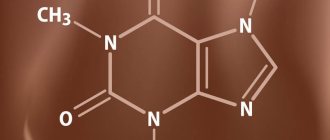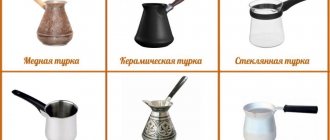What effect does caffeine have on the cardiovascular system?
Caffeine is the main substance in the drink, which underlies everything - both beneficial and harmful to the human body. The fewer deviations in health, the less chance of harming blood vessels when consuming it.
An initially healthy heart and the walls of blood vessels not clogged with cholesterol deposits are practically a guarantee that coffee will not cause any harm.
Positive Impact Aspects
Almost any natural product has many beneficial properties. And this alone gives reason to learn about the positive properties of natural coffee and its beneficial effects on the heart and the body as a whole.
- Contains potassium and magnesium. Coffee contains a lot of vitamins and microelements, including potassium and magnesium, which are vital for the heart muscle. See also the top 10 foods containing potassium.
- Reduces cholesterol. Both freshly ground and instant coffee are recognized as products that lower bad cholesterol levels in the blood.
- Fights infections and removes toxins. It is used in medicine, in particular, for certain infectious diseases, as well as if it is necessary to neutralize the effects of drugs, sleeping pills or poisons that suppress the central nervous system.
- Is a stimulant. It gives you the opportunity to cheer up when the body’s strength is running low. It stimulates brain function and affects physical and mental activity, so it is used not only as a tasty drink, but also as a natural energy product.
The invigorating drink has a number of properties that are an additional bonus for the body, in addition to its beneficial effects on the heart and blood vessels. This is first of all:
- antitumor substances that reduce the risk of developing cancer of the stomach, small and large intestine;
- substances that increase performance , mood, and prevent the development of stress even against the background of drinking alcohol, smoking cigarettes and an unfavorable social environment;
- prevention of diabetes, Parkinson's disease, asthma, liver cirrhosis and other diseases.
See also:
- 9 fruits and vegetables that are good for the cardiovascular system.
- Why nuts are important for the heart: what does the science say?
Negative aspects
Like any food product, it may have contraindications, as well as reasons for restriction.
- Inappropriate consumption of large quantities can cause dehydration , as it has a diuretic effect. This has a bad effect not only on tone in general, but also on the cardiovascular system. But knowing that about half an hour after drinking a cup of drink you need to drink a glass of drinking water, the problem can be easily avoided.
- It flushes calcium and some other microelements from the body , which are necessary for the proper functioning of the cardiovascular system. This can be prevented by adding natural milk or cream.
- With a sharp change in diet and the abolition of regular coffee consumption, the body can respond with depression of the physical and mental state: loss of strength, increased drowsiness, decreased physical and mental activity, hypotension and even real depression.
- Caffeine-containing products can aggravate symptoms of existing medical conditions.
The drink is strictly contraindicated for:
- stomach ulcers and other inflammatory processes in the gastrointestinal tract;
- renal failure;
- neuralgic diseases.
The different effects of the drink are related to the dosage and methods of its preparation. However, it is a myth that this drink can and does kill our heart.
The benefits and harms of coffee with milk
Due to the fact that the elements contained in milk do not enter into chemical reactions with the elements in coffee, the amount of useful substances in such an invigorating drink is greater than in a regular drink. Milk adds the following points to its beneficial properties: - slowing down aging; - increased brain activity; - preventing calcium leaching and the development of cancer. Drinking caffeine with milk is contraindicated in case of type 2 diabetes mellitus, pregnancy and breastfeeding, urolithiasis and heart disease.
How much is acceptable to consume?
Since the study of the drink does not stand still, both nutritionists and doctors are constantly changing their point of view regarding its dosage for different people, depending on the age and condition of the body.
Recent studies by Russian and foreign doctors and biologists have shown that drinking 2-4 cups per day is definitely safe.
If desired, 1 cup of coffee with milk can be drunk even by children starting from 10-12 years old, and by pregnant and lactating women, if they are used to it before pregnancy and there are no other contraindications (kidney failure, inflammation of the gastric mucosa, etc.)
What dose is healthy and safe?
Summarizing the pros and cons of coffee, it is easy to see that its consumption is generally approved by the scientific world. However, it's all about the right dose. Experts agree that three to four cups of coffee carries no health risks and has proven benefits. The Moscow Department of Health calls approximately the same amount safe: no more than 300 mg per day, and at one time no more than 100–150 mg of caffeine for a healthy adult. The average caffeine content in one cup of coffee is 80 mg, and about half that in the average cup of tea. Children and pregnant women should, of course, avoid caffeine. Tea lovers should also know when to stop: strongly brewed tea can have the same effect as weakly brewed coffee.
Text: Evgenia Shmeleva
Should you drink instant drinks?
Instant coffee is more convenient to drink as it instantly dissolves in water. It is sold in three forms: powder, granular and sublimated, which distinguishes them only by the production method and appearance.
In terms of content, for a soluble product they often use not noble Arabica, but a lower grade - Robusta. Additionally, to make powder or granules, the outer layer of the bean, which contains caffeine, is often removed altogether. It can be said that most varieties of surrogate drink do not contain caffeine. It is for this reason that you want to sleep after drinking instant coffee.
But the absence of caffeine does not make it healthier: on the contrary, no one can know exactly what the purchased powder contains and how many elements of the periodic table are mixed in it.
The “invigorating” effect is associated primarily with the effect of getting used to the ritual of drinking the drink and its aroma. Some doctors even consider this addiction to be a real addiction that has nothing to do with a healthy lifestyle.
Concluding that an instant drink has no positive properties for the body, with the exception of psychological ones, we can say that there is simply no point in drinking it, unlike a natural one.
The very rare use of a soluble surrogate by a healthy person will not affect his health in any way, but for a permanent menu it is better to choose a natural product that needs to be brewed.
As for pregnant, lactating, children and sick people, for many of them even one dose of a surrogate may be enough to cause serious health problems.
Contraindications
Despite the fact that the danger of drinking coffee is greatly exaggerated and is primarily related to the dosage of the substance, there are some cases when it is better to limit the drink.
- Children and old age. It is undesirable to use a strong stimulant both in adulthood and in baby food. In the first case, there are many disruptions to the body’s vital functions, and it does not need unnecessary stimulation. In the second, the functionality of the organs has not yet been developed, and caffeine is also not needed in childhood.
- Pregnancy and lactation. The effect of caffeine on child development has been little studied. But there are observations that indicate that caffeine in large quantities can cause fetal pathologies or lead to the birth of a child with reduced weight. But 1 cup a day will give the expectant mother pleasure and will not harm the baby. During breastfeeding, you should completely give up your favorite drink for a while, since the period of breastfeeding is one of the most hectic for mothers. And if the child’s increased excitability is added to the load of frequent feedings, then this will not benefit anyone.
- Ulcer and gastritis. The digestive tract is the first to take the hit. And even if the drink is natural, made from grains, and does not contain any unnecessary or dangerous additives, it still has high stomach acidity and has a strong effect on the gastrointestinal tract.
- Sick kidneys. Diseases of the excretory system weaken the kidneys. The diuretic effect and stimulation are not needed by these organs during an exacerbation.
- Glaucoma. The presence of this disease is a complete contraindication to drinking coffee.
Also beware of coffee addiction, which we discussed in more detail in a separate article.
Can it cause chest pain?
Many drinkers have noticed pain under their left shoulder blade after drinking it.
But very often people have a number of health problems that they are not even aware of, but the symptoms of which are similar to heart pain. If a person drank a coffee drink and had a chest pain, this could result in illnesses such as:
- neuralgia;
- stomach ulcer;
- gastritis;
- pancreatic diseases, etc.
If these problems are excluded by doctors, then it is necessary to understand the answer to two important questions.
Why is this happening?
By affecting the central nervous system, caffeine can cause:
- increased excitement,
- increased heart rate,
- increased blood pressure
- and, as a result, heart problems.
Most often this occurs due to exceeding the permissible dose of consumption . Symptoms appear when a person drinks regularly 5-6 cups a day or after the usual normal dose, but in a state of any stress on the body (lack of sleep, acclimatization, increased fatigue, etc.).
What to do if pain has already appeared?
Is it possible to drink coffee if you already have chest pain? If, as a result of drinking the drink, tachycardia appears, the person begins to feel short of breath, or dizziness appears, you need to stop drinking the drink. In this case it is necessary:
- place it at a high angle, for example, on a high pillow;
- ventilate the room;
- give half a liter of clean and still water to drink in small sips;
- give the opportunity to rest for a few minutes.
If such attacks occur repeatedly , it is necessary to consult a cardiologist to rule out serious diseases of the cardiovascular system. During the period of examination, it is better to replace the usual taste with a very similar one: high-quality chicory will not only not harm the heart, but will also significantly improve the health of the entire body.
Daily value and recommendations for use
According to various nutritionists, the permissible daily intake of caffeine ranges from 300 to 500 mg. Otherwise, the digestive system suffers, since the drink increases the acidity of the stomach, and tachycardia and cardiac arrhythmia may occur.
If there is concern about exceeding the dosage, it is recommended to drink a drink with beneficial additives.
- Milk or cream. Dairy products can bind tannins and reduce the effects of coffee on the organs. This combination is especially useful for those who have stomach pain. Milk also replenishes calcium reserves that are washed out of the body if consumed regularly. You just need to remember that in this case the calorie content of the product increases, and in the case of cream, cholesterol may also increase.
- Honey. The bee product helps to enrich the diet with minerals that are lacking in coffee.
- Lemon. Citric acid slightly neutralizes the effect of caffeine. Therefore, it is good to add lemon if you have a great passion for the drink. In addition, it replenishes vitamin C reserves. Lemon also thins the blood.
- Cinnamon. This spicy spice improves metabolism and, together with caffeine, promotes weight loss. But you need to know that cinnamon should not be consumed in large quantities by pregnant women, those with liver and kidney diseases, as well as hypertension.
The longer the ground beans are infused in water, the more caffeine in the drink. Therefore, if you need to invigorate well and for a long time, you need to drink it without adding milk and lemon, infusing it properly, for example, in a French press.
Other frequently asked questions
There are many different myths around everyone’s favorite drink. Therefore, people often want to know the exact answers to many of their questions.
Sometimes there are simply no clear answers, but nevertheless, their options will give you the opportunity to draw your own conclusions depending on how you feel.
After consumption, the heart beats strongly: why and what to do?
If the heart begins to beat faster than usual and seems to tremble, this condition is called tachycardia. Caffeine does not cause tachycardia very often. Basically this happens:
- if the dose is exceeded (more than 4-5 cups per day);
- when the strength of the drink is too high;
- with existing heart diseases.
Therefore, if palpitations appear every time after taking it, you need to visit a cardiologist , do an ultrasound of the heart and take measures to detect pathologies.
If you feel a tingling sensation
A high-quality natural drink itself never causes heart disease: on the contrary, it contains potassium and magnesium, which are essential for the heart muscle and contribute to its work.
In one-time cases, the situation can be corrected by drinking about half a liter of water in small sips and taking a short rest.
But if your chest hurts every time after taking a drink, then just in case, you should visit a cardiologist to rule out the possibility of serious diseases , as well as a neurologist and gastroenterologist, because the clinical picture of many diseases is very similar to signs of heart pathologies.
Smoking can also cause colic: nicotine constricts blood vessels, which can make it difficult for the heart to pump blood. What to do in this case is up to each patient to decide for himself...
Can this drink stop your heart?
If earlier doctors all over the world warned their patients about the dangers of caffeine for the heart, now the picture has changed.
How much you need to drink to cause death is unknown. Doctors warn against drinking large quantities (5-6 servings per day) of strong drink, but allow drinking 1-2 cups per day. And not only because this dose is harmless to the heart muscle, but also because in such small quantities it has a beneficial effect on the cardiovascular system and even prevents many diseases when regularly introduced into the diet.
Is it possible to drink it before an ultrasound and ECG?
When preparing for an ECG and ultrasound, doctors do not recommend taking caffeine-containing products.
When examining, it is important to see an objective and most reliable picture of the condition of the main organ. And if the dosage of coffee is incorrect, medical devices may show inaccurate data on various parameters.
IMPORTANT: 4-6 hours before the start of the procedures it is better to refrain from drinking a drink, and 2-4 hours before the start of the procedure - from eating; It is advisable to carry out these examinations on an empty stomach.
Clotting
Coffee is contraindicated only if you have a tendency to bleed (Photo: pixabay.com)
Studies have found a negligible effect of coffee on blood clotting. It is not so great as to recommend the drink for the prevention of stroke and blood clots. But it is not so insignificant that it could be used for hemophilia (coagulation disorders and tendency to bleeding), on the eve of operations and before childbirth.
So if you do not have blood pathologies and are not planning surgery in the near future, you can drink the drink without fear.
Use for certain diseases
Scientists are still arguing about the admissibility of coffee in the diet of people with cardiovascular diseases. But recently, most doctors agree that a categorical restriction on caffeine is necessary only in very rare cases.
For hypertension
Previously, it was believed that since coffee increases blood pressure, there is no need to drink it if you have hypertension, but should be replaced with a decaffeinated or completely different drink.
But recent research by scientists has shown that such a reaction in the body occurs only in those who usually do not drink at least one cup of the drink a day. Moreover, they found that decaffeinated coffee also only affects those who do not drink an instant decaffeinated substitute. But since the pressure increases even in the second case, then caffeine has nothing to do with it.
CONCLUSION: One cup of coffee a day not only won’t hurt, but can also prevent a sharp increase in blood pressure.
For arrhythmia
Doctors traditionally advise giving up the drink if you are prone to arrhythmias. But targeted medical studies have shown that people who use it are often hospitalized even with the most severe type of arrhythmia - atrial fibrillation.
However, even when drinking more than 4 mugs a day, such cases are much less than with those who do not drink coffee at all. Moreover, if arrhythmia is combined with a too rare heartbeat, then a portion of natural coffee can normalize the heart rhythm.
CONCLUSION: if you like the drink, then this is not a reason to refuse it due to arrhythmia; on the contrary, moderate consumption will prevent the onset of the disease.
With tachycardia
Caffeine-containing products are not capable of causing tachycardia on their own. But after consuming them, the following symptoms sometimes appear:
- cardiopalmus;
- feeling of lack of air;
- wobbly legs;
- darkening of the eyes;
- nausea;
- sudden sweating.
This suggests that caffeine either provoked the manifestation of some other disease, or entered the body against the background of:
- overwork;
- lack of sleep;
- stress;
- inflammatory processes in the body, etc.
ATTENTION: if the symptoms of tachycardia listed above appeared against the background of drinking an instant decaffeine-free drink, then this only means that the surrogate is saturated with harmful chemicals, it is undesirable to use it even for healthy people and is strictly forbidden for pregnant, lactating and children.
For angina pectoris
Caffeine cannot cause angina. This is a disease accompanying atherosclerosis. And if it already exists, then caffeine will interfere with the normal functioning of the heart, since the lumens in the arteries pumping blood to the heart are reduced.
From a lack of blood, the heart muscle will suffer from oxygen deficiency, and as a result, coronary spasm may occur.
Therefore, if angina pectoris is diagnosed, then it is better to drink chicory and other healthy and tasty drinks.
For heart failure
Many doctors traditionally prohibit the use of caffeine-containing products for heart failure.
But a lot of recent medical research shows that caffeine is safe for this disease and cannot cause heart failure and arrhythmia if we are talking about reasonable consumption of the product.
After bypass
After surgery in the form of coronary artery bypass grafting, a gentle diet is recommended for a long time.
But only alcohol in any of its forms is considered a strictly prohibited drink.
Regarding coffee, most doctors agree that if you really want it, you can drink it weakly, with the addition of milk.
The diet can also be diversified with instant chicory, barley drink, weak teas, especially herbal teas, hibiscus, mate.
After a heart attack
A heart attack is a serious cardiovascular disease. But there is no direct connection between myocardial infarction and coffee: the aromatic drink has never been the cause of the disease.
Meanwhile, a strong invigorating effect is not needed during the recovery period: the body needs long-term rest after an illness.
If the patient is pleased with the aroma and is accustomed to small doses of the drink, then you can always drink one cup a day in half with milk: it will not harm, but will bring positive emotions that are very necessary for the recovering person.
For ischemic disease
Until the 90s of the 20th century, it was believed that the drink was strictly contraindicated for cardiac ischemia.
But research over more than 30 years has shown that the disease occurs just as often in those who have not consumed any caffeine-containing products for decades as in those who have regularly included the drink in their diet for 30 years.
IMPORTANT: if ischemia is also combined with low blood pressure, coffee is even indicated for the patient.
A wonderful invigorating drink is in vain accused of harming human health.
Prohibitions with Holter monitoring
During monitoring, the following actions are prohibited:
- turning off the device during sleep;
- X-ray, CT or MRI;
- active sports;
- self-removal of electrodes.
When taking a shower, be careful not to get the device wet!
The study makes it possible to identify various disorders at an early stage. This is an important diagnostic procedure to evaluate heart function. If your doctor has recommended that you undergo such an examination, you should not postpone it.
Video on the topic
Also check out the video below:
Properly prepared (not soluble!), consumed regularly, but in small doses (1-4 cups per day depending on age, lifestyle and health), it can not only deliver a lot of positive emotions, but also prevent many severe and even fatal diseases.
This applies to the entire body and the cardiovascular system, with the exception of a narrow range of pathological conditions. Coffee for the heart, when handled correctly, prevents diseases and maintains vitality.
Decaffeinated coffee
Scientists' discovery of the harmful properties of caffeine has upset many avid caffeine lovers. But coffee companies found a way out and offered consumers “decaf” - caffeine-free varieties. These varieties are conventionally called decaffeinated - they still contain caffeine, but in small quantities.
There are several methods of decaffeination:
- The direct method is the first decaffeination technology invented. This method is also called “European”. The essence of the method is that the beans are moistened in hot water and immersed in a solvent (methylene chloride or ethyl acetate), where the caffeine is partially destroyed. After which, they are washed and dried. The main disadvantage of the technique is that the solvent is not completely washed out and remains in microdoses.
- The Swiss method was developed back in 1979 and today remains the most effective method, capable of removing up to 99.9% of all caffeine. The technique is that the grains are filled with water and left for a long time. During the settling process, most of the aromatic oils and alkaloids pass into water. In the second stage, the water is purified through a filter that retains the caffeine and returns to the beans. So the entire cleaning process is repeated several times.
- The indirect method is similar in principle to the direct method, but with the difference that the soaking procedure lasts a little longer and weaker solvents are used in the second stage of cleaning. This way the grains better retain their taste and beneficial properties. The method is a little more expensive than the direct method, but the quality of the final product is noticeably higher.
- CO2 extraction – the quality of the final product is comparable to the Swiss method. At the first stage of cleaning, the grains are treated with steam to soften the product. And then they are sent to a special chamber, where they are washed under pressure with CO2 gas. Carbon dioxide washes out only the caffeine from them and leaves the aromatic oils intact. After cleaning, no foreign impurities or chemicals remain.











